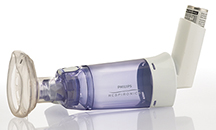New Patient Education Reduces COPD Readmissions
May 2, 2019North Kansas City Hospital is making significant headway in reducing COPD readmissions. A multidisciplinary team involving Case Management, Pharmacy, Respiratory Care, Home Health and Nursing are working together to provide patients with additional education and tools.
The hospital’s rolling cumulative COPD readmissions decreased from 20.5% in April 2018 to 13.6% in March 2019. For Medicare patients, those figures were 23.6% and 12.6%.
For patients with COPD, the ramifications of multiple hospitalizations are broad.
"The more often patients are hospitalized, they have an increased risk of secondary complications, such as a blood clot, infection and muscle mass due to immobility,” said Alexis H. Meredith, MD, opens new tab, a pulmonologist with Meritas Health Pulmonary Medicine, opens new tab. “This heightens their anxiety about their condition, but also about experiencing lost work and family time.”
|
NKCH COPD Readmission Rates |
|||
|---|---|---|---|
| All Players | Readmissions | Discharges | Rolling Cumulative 12 Months |
| April 2018 | 7 | 40 | 20.5% |
| March 2019 | 7 | 49 | 13.6% |
| Medicare | Readmissions | Discharges | Rolling Cumulative 12 Months |
| April 2018 | 4 | 23 | 23.6% |
| March 2019 | 2 | 20 | 12.6% |
Reduced Readmissions
In October 2012, the Centers for Medicare & Medicaid Services established a penalty for high rates of 30-day readmissions as part of the Hospital Readmission Reduction Program. This set the stage for CMS to penalize hospitals that have excess readmission ratios for six conditions and procedures, including COPD.
“COPD is a physically and mentally difficult disease,” Dr. Meredith said. “Many patients don’t have support and don’t know where to reach out for resources. By being able to provide that, we can make a difference in people’s lives.”
Medication Control

The spacer connects to a metered-dose inhaler. Credit: Philips Respironics
Part of NKCH’s new patient education focuses on teaching patients how to use their metered-dose inhalers correctly with a spacer so medication reaches their lungs instead of the back of their throat. The spacer, which the Pharmacy provides, helps patients better administer their medications in a two-step process.
The spacer connects to an MDI mouthpiece. First, patients push down on the inhaler, which brings medication into the spacer. Second, they take one long deep breath, which slowly brings medication into their lungs. Patients keep the spacer with them during their hospital stay and take it home at discharge.
“Even when patients are given instructions on how to use an inhaler, about half use them inappropriately,” Dr. Meredith said. “The spacer takes the difficulty out of it.”
Education
Respiratory Care developed a patient education brochure for RTs to review with each patient. Topics cover how to improve lung function and sputum clearance, manage shortness of breath and follow a healthy diet.
The brochure includes a list of NKCH resources, such as Pulmonary Rehab, the Better Breathers Club of the Northland, the Living Well With a Chronic Condition class and The Patient Channel Now, as well as the COPD Foundation and SmokeFree.gov, opens new tab.
NKCH physicians can order tobacco cessation education for patients with COPD. The customized program, which can be ordered for all patients, allows them to move at their own pace, meet their goals and stop tobacco use.
Remote Patient Monitoring
NKCH Home Health also expanded its remote patient monitoring services to cover patients with COPD, as it is paramount to remotely monitor their blood pressure and heart rates, oxygen levels and weights when patients return home. Nurses monitor patient responses to a variety of RPM-generated questions about their health, which further ensures continuity of care.
Questions cover whether patients:
- Are short of breath and/or wake up at night due to shortness of breath
- Cough more frequently and/or cough up more sputum
- Have a fever
- Are sleepier and/or more tired than usual
- Have a change in their pulse oximeter level
- Are taking their medication
- Have side effects from medications
- Have been exposed to smoke
Mark Petermeier, RRT, director of Respiratory Care and Sleep Centers, also provided Home Health nurses with an educational in-service, covering updated standards and various types of MDIs.
Alexis H. Meredith, MD
 Dr. Meredith, opens new tab earned her medical degree and completed her residency in internal medicine at the University of Kansas School of Medicine, where she was later a fellow in pulmonary and critical care medicine.
Dr. Meredith, opens new tab earned her medical degree and completed her residency in internal medicine at the University of Kansas School of Medicine, where she was later a fellow in pulmonary and critical care medicine.